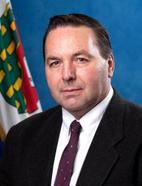Thank you, Mr. Speaker. The department is willing to work with all communities, big or small, for the needs of the citizens of the Northwest Territories. I'd be glad to sit down with the Member and discuss what their possible needs are. Thank you, Mr. Speaker.
Wally Schumann
 Legislative Assembly photo
Legislative Assembly photoRoles
In the Legislative Assembly
Elsewhere
- His website
- Twitter (and Twitter messages to him)
- Wikipedia
Crucial Fact
- His favourite word was going.
Last in the Legislative Assembly September 2019, as MLA for Hay River South
Lost his last election, in 2023, with 30% of the vote.
Statements in the House
Question 69-18(2): Community Access To Department Of Transportation Gravel Crusher February 24th, 2016
Question 64-18(2): Community Access To Department Of Transportation Gravel Crusher February 24th, 2016
The community of Aklavik has different access to funding through infrastructure money through MACA and other sources, so I'd encourage the Member to have the community look at those sources of revenue.
Question 64-18(2): Community Access To Department Of Transportation Gravel Crusher February 24th, 2016
I would encourage the community of Aklavik to work with businesses in the Beaufort Delta region to the private sector to fulfill its crushing needs.
Question 64-18(2): Community Access To Department Of Transportation Gravel Crusher February 24th, 2016
I don't know how we pick communities, who's on the priority list or anything, but I'm sure there's a schedule, and based on priorities and needs. I can commit to looking into that for the Member.
Question 64-18(2): Community Access To Department Of Transportation Gravel Crusher February 24th, 2016
Thank you, Mr. Speaker. I cannot commit to how many crushers we have available for community access. Thank you, Mr. Speaker.
Minister’s Statement 11-18(2): Climate Change Adaptation And Resilient Infrastructure February 24th, 2016
Thank you, Mr. Speaker. One of the key challenges facing the Northwest Territories’ transportation system today is climate change. In the past years, warming temperatures have led to permafrost degradation causing roadbed and runway instability, and shortened operating seasons for winter roads. But climate change also means lower water levels that are disrupting marine resupply services for remote communities, forest fires that are causing travel delays and permafrost and infrastructure damage. The Department of Transportation is committed to creating a more resilient transportation system that is flexible to change for the better and generate significant benefits to Northern residents and businesses alike. Research and development is critical to improving our understanding of climate change and identifying best practices for adaptation. With the help of emerging technologies, we are trying to identify promising opportunities to improve efficiency, safety, and environmental performance of the transportation sector. The Department of Transportation has collaborated with Transport Canada on several research and development initiatives within the Networks of Expertise in Permafrost and Arctic Waters under the federal Northern Transportation Adaptation Initiative. These projects have contributed over $4 million towards climate change research in the Northwest Territories. Ongoing investment from the Government of Canada is necessary to continue advancing our progress and we are encouraging our federal partners to continue their support and renew funding for these projects.
The Northwest Territories’ unique environment allows us to take a leading role in climate change research. The Inuvik-Tuktoyaktuk Highway is being constructed over continuous permafrost, making it an ideal location for innovative construction techniques that help to adapt to the impacts of climate change. Two sections on the highway are currently being used to test innovative stream crossing structures and deep fill embankment techniques. We also have 70 sites along the way where in-ground thermistors are constantly monitoring permafrost temperature. The Department of Transportation is also taking advantage of modern technology to receive timely information on weather conditions. A new Tablet Runway Condition Reporting System is being used to report on runway surface conditions at Northwest Territories airports, improving flight planning for our pilots. The tablet system increases the accuracy and timeliness of reporting on runway conditions, resulting in increased safety for air travel. It remains a long-term priority of the Department of Transportation to upgrade all winter roads in the territory to all-weather roads. The department is currently advancing three key strategic transportation corridors, including the Mackenzie Valley Highway from Wrigley to Norman Wells, the Tlicho all-weather highway, and improved access into the Slave Geological Province. These projects will respond to climate change and increase access to Northern communities, lower the cost of living for residents, and provide access to our natural resources and new economic development opportunities. The Government of the Northwest Territories must continue taking steps to protect our existing infrastructure assets. Adaptation and innovation are the best tools to ensure a resilient transportation system that meets the needs of Northwest Territories' residents and industry. Thank you, Mr. Speaker.
Question 59-18(2): Planning For The 2016 Wildfire Season February 23rd, 2016
As the Member knows, the complexity of some of these fires and the nature of them, if we have time we will definitely consult.
Question 59-18(2): Planning For The 2016 Wildfire Season February 23rd, 2016
Depending on the type of fire season we have, if we have a normal or below-normal fire season, we will continue to use our own resources. Anything beyond that, we may have to pull in other people from other jurisdictions.
Question 59-18(2): Planning For The 2016 Wildfire Season February 23rd, 2016
We continue to monitor snowfall for this seasons, but I have previously said to the Member, we continue to see the NWT in the drought conditions, so it's hard to predict what type of fire season we're going to have.
Question 59-18(2): Planning For The 2016 Wildfire Season February 23rd, 2016
Thank you, Mr. Speaker.
The NWT continues to be under severe seasonal drought conditions in a large portion of the NWT. ENR continues to implement strategies and objectives identified in the 2011 program review and the 2014 fire season to improve delivery of the programs the coming seasons.